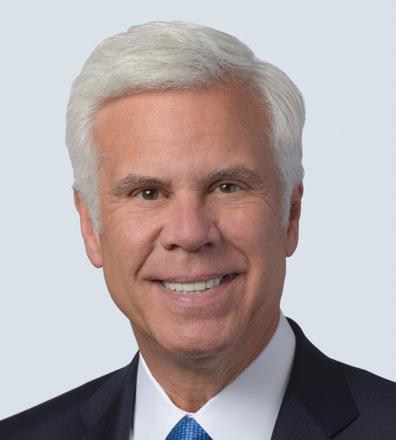
2 minute read
Interview: George Norcross
Adaptability
Despite the scare from the pandemic, dire projections failed to materialize
Advertisement
George Norcross
Executive Chairman – Conner Strong & Buckelew
How would you characterize the service demand that is driving your growth? It comes from all aspects. Large companies, which make up about two-thirds of the businesses we work for, are asking for property and casualty services. In almost all cases, they are self-insured, with some capacity for extreme risk management capabilities. About a third of our businesses require services around employee benefits and consulting all across the country. Given the scare that COVID put into many companies in America, they started looking at every dollar they were spending. Throughout 2Q20, people were scared to death of what was going to happen in the country. For most American companies, it did not turn out as bad as it was projected to, meaning businesses managed to continue in alternate ways. By and large, most companies adapted fairly well.
What does the ongoing digital transformation look like for the industry and particularly for your firm? Technology has enhanced the way we all do business. The insurance brokerage industry decided to start a company called Broker Tech Ventures, which specializes in investing in and promoting technological advances in our business so that we can share those with our clientele. We’ve put millions of dollars into that, as have other companies, to help enhance what we are doing. On a daily basis, your business either gets enhanced, providing the services your clients need or expect, or you’re going to miss your growth objectives and lose business. Failing to secure that constant revamp will cost you your spot at the forefront of the changes that are taking place every week and every month in any business. The biggest capital expenditures, excluding bricks and mortar, are technological developments. The amount of money we as a firm spend in that rubric is astronomical. What does South Jersey have to offer in terms of healthcare, life sciences and research? Our region is second to maybe Boston in terms of healthcare and life sciences. There are major medical schools and healthcare institutions here that rival those of Boston and New York. All that being said, the life science industry has gravitated in part away from New Jersey and more to Massachusetts because of massive tax incentives. Many executives in that industry describe Massachusetts as a less regulatory environment with grade-A universities — Harvard and MIT. New Jersey used to have a monopoly in terms of the pharma industry. To some extent, the perceived or real taxation and regulatory environment in New Jersey has, at least according to the executives we speak to, hurt significantly the dominance that it once had.









